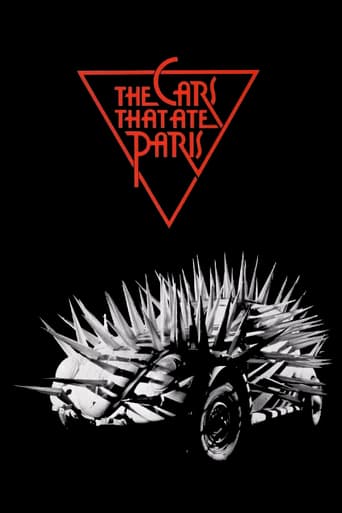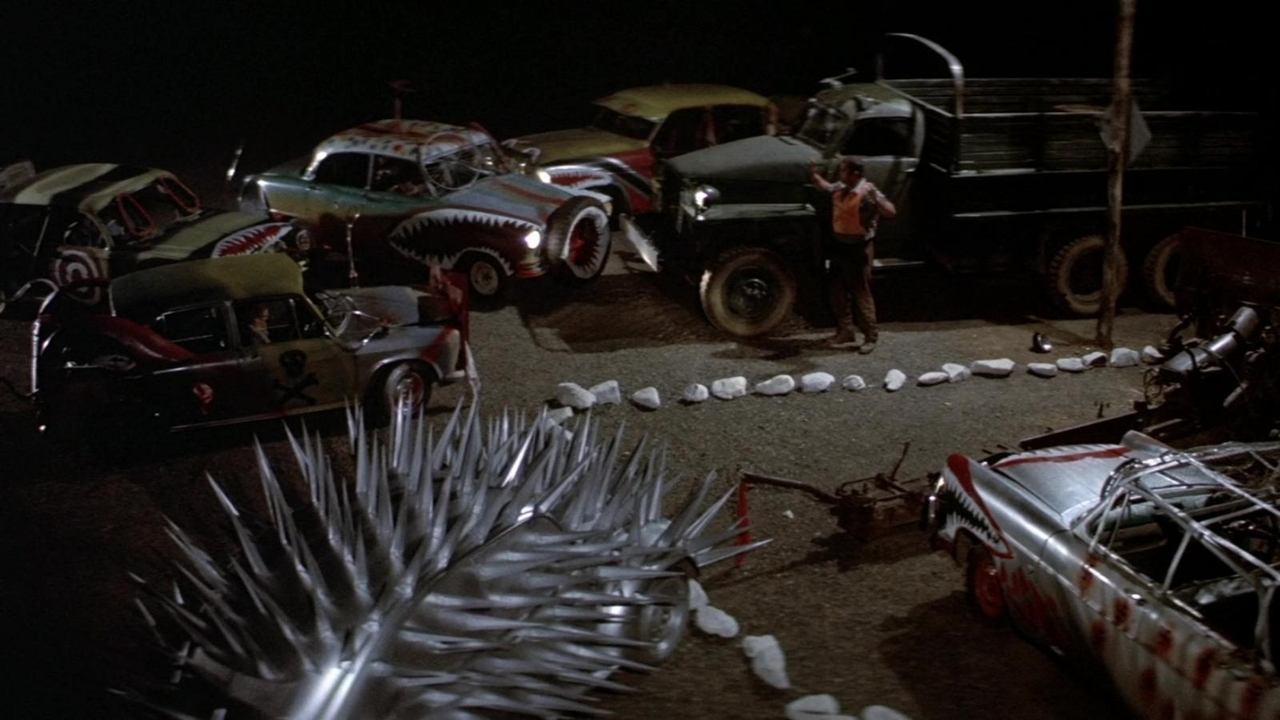zimmyfan66
"The Cars That Ate Paris" is delightfully shocking in a way that still resonates today. I say delightfully because there is every indication in the subtext of the film that what we're watching is a biting, hilarious satire. It works as a satire because of the naturalness of the actors. It doesn't work so well to caricaturize personalities in film as much as it does in literature because caricaturization loses its shock and becomes simply a cause for unbelieving laughter. Instead, satire works better in film when the personalities of the characters are as honest as can be against the backdrop of outrageous circumstances. I'm sure I could think of exceptions, like Dr. Strangelove for example, which needs the caricaturization I think because its plot deals with the mechanisms of government and war. When the scale is that large, caricaturization works. But "The Cars That Ate Paris" doesn't have such lofty targets. It deals with the ordinary people in the world who are easily swept into the agendas of others, sometimes by their own mindlessness. Speaking again for the naturalness of the actors, the "ordinary people" in this film all seem like real citizens of a dusty, scavenger town with delusions of order and efficiency. I was particularly stunned by John Meillon who plays the mayor of the dusty, scavenger town called Paris, Australia. His performance is so seamless, so richly mixed between an authoritative assurance and a desperation to hide from the truth, that he is frightening, frightening in what seems to be his complete lack of introspection or morality. And there doesn't seem to be the need for either in Paris. His character, while in control of most of the goings-on in the town, doesn't seem to need to order anyone around. It's as if they accepted him and his authority as a matter of practicality, as if it were unfathomable to do otherwise. He therefore carries an almost metaphysical command over the actions (and even appearances of) the other characters in the film. It's a hefty role to take on and make real, but John Meillon succeeds marvelously. It's one of the great bad guy performances that isn't really a bad guy performance. As an audience member you just feel the entropy and instability vibrating behind the eyes of Meillon. Aside from the natural acting, the film succeeds because of Peter Weir's vision, which finds its greatest catalyst in the "wild west," sepia toned cinematography by John McLean. The camera is focus more on the faces of the actors than anything, and anytime it steps out into the dirt roads of Paris, it exposes hardly anything other than the commotion and impenetrability of the town. It's a skillful early work from Weir who would later succeed again in satirizing authority and control over the events of life with The Truman Show in 1997. The only thing that wasn't all that awesome was the performance by Terry Camilleri as Arthur, the man who comes to live in Paris by accident. It seems like he was uncomfortable as an actor, almost unable to get into his character's shoes. However, it doesn't ruin the film when Meillon's performance is so intoxicating.
rtb1961
A movie done in style, all about relations between people, not normal people but where everyone is insane to varying degrees. These insane people try to create a town whose purpose, whilst fulfilling the normal needs is done in an insane fashion. They trap passing motorists at night and run them off the road. Should they survive they handed over to a macabre doctor who lobotomises them with a power tool to become his, experiments. There cars are stripped of any valuables than burned. Any equally disturbed individuals are recognised and kept to become a part of the insane community. To be best enjoyed as art background when suitably intoxicated and quietly partying. A movie clearly done to be enjoyed in this style, as it drifts from sane to insane in the same activity, as moments drift from sense to senseless. A movie that keeps you hanging on the edge of having a plot, of accelerating the story, of having real meaning only to leave you drifting along with it.
ProgressiveHead
At least as bizarre as it sounds, this early feature from Peter Weir (Picnic At Hanging Rock, Witness, The Truman Show, Dead Poets Society) begins with two brothers driving into a small, isolated, rural town. Upon entering, they have a serious car accident which kills the older brother and leaves the grief-stricken younger brother, Arthur Waldo (Terry Camilleri), to undergo his physical and psychological rehabilitation in an unknown place, surrounded by more than a few rather strange characters. The local mayor takes Arthur under his wing, offering him board at his house with his family and a respectable job at the local psychiatric ward, later on appointing him town Parking Officer. On the surface all is well in Paris... although newcomers seem to have rotten luck on the roads in and out of town.The film operates very much within the confines of a western (overtly so during one scene, being something of a standoff - Arthur is asking some of the local carheads to park their vehicles in a different spot).Performances are generally very good, particularly John Meillon as the mayor. Also features a demented Bruce Spence, who many will recognize from Mad Max 2: The Road Warrior, in a supporting role.The film's score may well divide audiences. Personally I liked it very much as it was willing to take risks. There wasn't just the usual dramatic flurries and simmering undercurrents - there are some great pieces and it offers a bit more than many modern Hollywood productions. Disturbingly effective at several points was the gentle music following the restoration of the idyllic structure of the small town, so restored often as a result of grossly immoral acts. (Think of the Men's Group in The Stepford Wives or "the greater good!" mentality of the townsfolk in Hot Fuzz).The Cars That Ate Paris comes admirably close to being a full-on classic, and offers much to seasoned genre fans (providing you don't mind Australian accents, and I notice they were noticeably thicker in these older films).Peter Weir would later go on to bigger and better things, but The Cars That Ate Paris remains a genuine cult classic and an important piece of early Australian cinema.
ThrownMuse
The people of a small Australian village deliberately cause car accidents for out-of-towners passing through so they can profit from looting. One victim survives and the community tries to make him a member, but he unintentionally rekindles what appears to be a feud between the elders and the car-loving youths. Whoa. Huh? What? Right. The Netflix envelope said this was a satire about how much Australians are obsessed with cars (?) and a review I read implied that this film is a metaphor for New Nationalism in the 70s (??) All of that flew over my head. Still I can't say I didn't like Peter Weir's first film, and it works as a decent slow-burn horror. Also, some of the designs on the rebel youth cars were damn nifty.


 AD
AD

